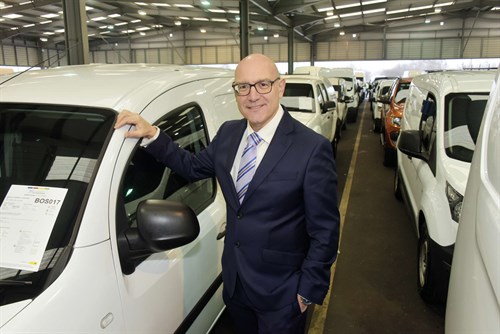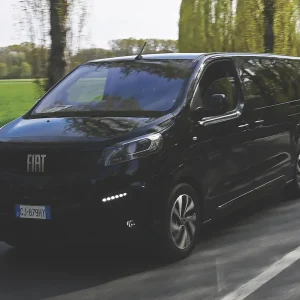What features and equipment make used vans stand out for buyers at an auction?
This question is becoming even more pertinent as LCV customers are now much more fussy and demand the same sort of equipment that cars have – not just the likes of metallic paint and aircon but also safety and driver assistance kit.
A shortage of good-quality, ready-to-retail used vans is leading to fierce competition, and generally rising values, for the best examples – and there’s no better way of upping these values than by fitting vans with the equipment buyers want.
Aston Barclay’s commercial vehicle sales manager Geoff Flood says practical features such as Bluetooth for hands-free phone operation, central locking, power steering, reversing sensors and electric door mirrors are seen as essentials, “while the more sophisticated features are only specified if they add value to the operation of the business”.
“If the vehicle is being purchased for the recreational market then the higher level of specification on the used van, the better,” he says.
“Not surprisingly, the VW Transporter is a big favourite as many used vans are purchased and then converted into camper vans, so a high base level of specification is very important,” says Flood, who notes that satnav and rear parking sensors are certainly desirable at the moment and will always make a significant value difference against CAP.
The average van is definitely becoming more complex with a wide range of options for the used buyer, says Jon Gilbert, BCA’s business development director, LCVs: “Many look for phone connectivity and a factory-fitted satnav as the starting point. We are also seeing a rising expectation for park-assist features and parking cameras as operators look for ways to manage in-life costs and reduce vehicle damage.”
BCA’s most recent study showed that LCVs fitted with aircon outperform those without by a considerable margin in values achieved, performance against guide values, and conversion rates. “Vehicles fitted with aircon are very desirable at remarketing time and values typically outstrip standard vehicles by a considerable distance – well over £1,000 on average,” he says.
Tim Spencer, commercial vehicle manager, Shoreham Vehicle Auctions, says today’s buyers expect as much from a used van as they do a used car – “with certain levels of equipment and trim a ‘given’ at different price points. And the higher the specification the better in terms of returns at auction and demand”.
“Features such as air-conditioning and reversing sensors are now very much ‘standard requirement’ and are what 90% of buyers are seeking as part of a quality used package as they know they’re a key component of a vehicle’s make-up for the end user,” he says.
Vehicles without are increasingly becoming the exception to the rule. “Buyers know and understand this and recognise the higher specification a vehicle is – without entering the realms of ‘luxury’ – the more attractive a vehicle will be,” Spencer continues. “Ultimately, understanding your target market is key when it comes to specifications.”

Gilbert: End-users want a vehicle with everything they need ready-fitted
(Continued from page 1) Meanwhile, equipment such as airbags are seen as something that come as standard on all vans, “so buyers don’t go looking for them on used vans – they expect them,” says Aston Barclay’s Flood.
Although air-conditioning is something they will opt for if they have drivers working for long hours and travelling long distances, if they want a vehicle for a few short, local deliveries then SMEs are happy to save money and buy a more basic van with less specification fitted, says Flood. However, he adds: “Trade buyers who generally purchase from auction will always look for aircon as it helps them retail the vehicle.”
Even something as simple as a colour will make a significant difference. In fact, a metallic silver van will make more money than a white van by a few hundred pounds, as Flood explains: “SMEs are always looking for a van that stands out from the crowd and so are prepared to pay more money for a silver rather than a white van.
“Metallic paint will help increase the auction price if the vehicle is in good condition. If the grade on the vehicle is poor then buyers often tend to steer clear, as the cost to refurbish is too expensive.”
However, a vehicle with metallic paint will greatly depreciate in value if there is bodywork damage, as these panels can be expensive to repair, particularly if the van is more than four years old.
Spencer says that, increasingly, vehicles – especially high-volume units such as Ford Transits – that stand out from the crowd with metallic paint, for example, “will always create greater demand amongst buyers than simply white options”.
Flood believes that demand for safety kit is yet to really take hold within the market, although the likes of ABS is today the norm and more advanced driver assistance systems are far more commonplace.
So while he believes a more sophisticated smaller business may decide to buy a used van with safety features fitted, such as autonomous emergency braking, he says that “currently, this …is not a top sales priority for buyers in the same way that age, mileage, convenience features and vehicle finish might be”.
“Generally, safety features aren’t as important as a full service history and a vehicle in good condition that is reliable. But this is not to say it won’t become that way in future as consumers and businesses become increasingly aware of these features, and therefore the market will adapt to highlight these areas.”
Gilbert adds: “Business owners have a duty of care to their drivers and we are seeing more LCVs fitted with a range of advanced safety technology. Options such as blind-spot detection and lane-assist certainly have an appeal. As more LCVs are fitted with these options as standard, we will see demand build in the used market.”
Gilbert also believes security has always been and will always be a key issue for auction van buyers: “Buyers look for vans fitted with slam locks and advanced alarms, as theft of tools and goods is such a major issue for small businesses and independent tradespeople now.
Professional buyers want to buy a van for the forecourt in as close to retail-ready condition as possible, while end-users want to buy a vehicle that has everything they need ready-fitted.”
Something else to consider when specifying a light commercial vehicle is how it meets legislative requirements. In January, we saw owner-operators face a deadline in London to conform to the Ultra Low Emission Zone changes. “Euro6 is also becoming an important requirement and values are currently strong for these vehicles,” says Gilbert. “More buyers will look to replace their current vans as volumes increase over time and values settle to a more manageable and affordable level.”
Ultimately, the higher spec a vehicle is, the more valuable it is in the buyer’s eyes. Gilbert concludes: “At the end of the day, a better specification will make a van more desirable and saleable, and higher-spec vehicles will often sell the first time they are offered, improving cash flow for the seller.”





